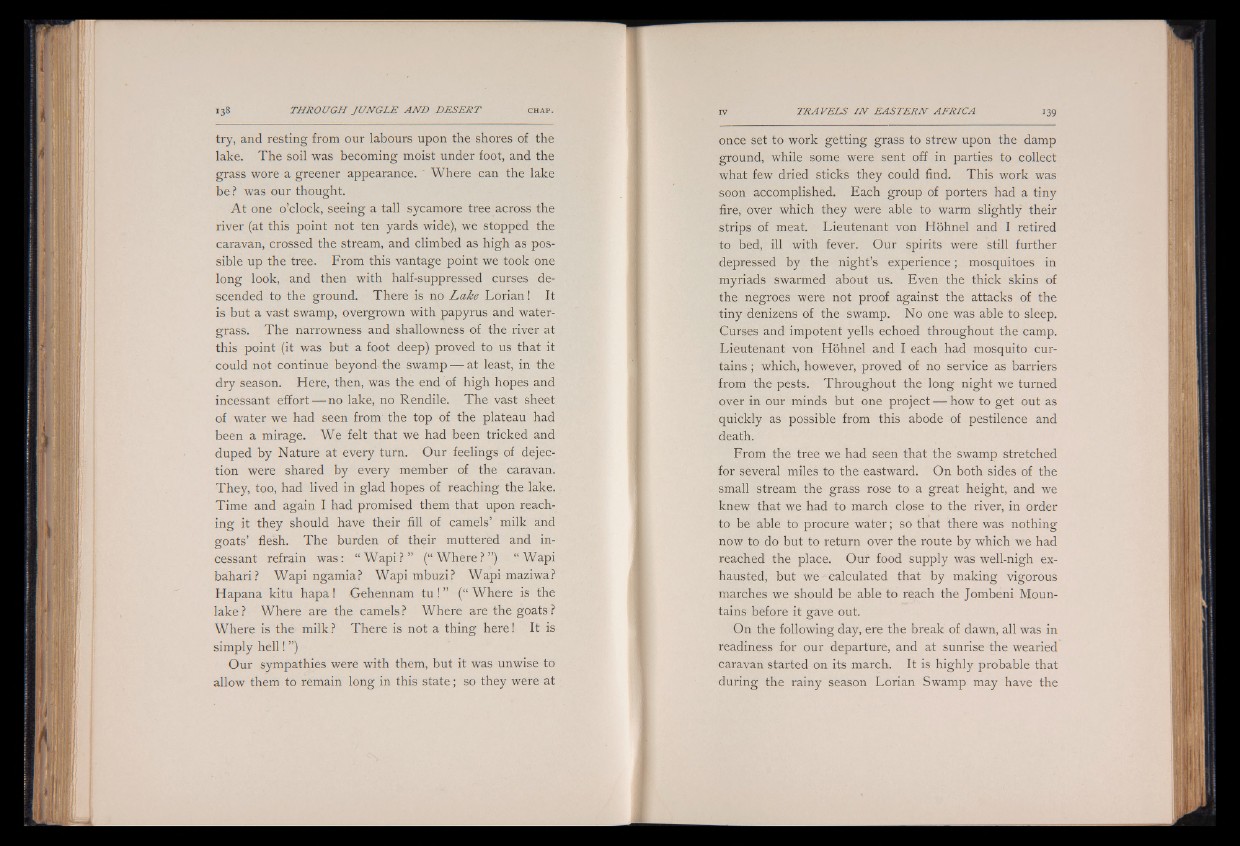
try, and resting from our labours upon the shores of the
lake. The soil was becoming moist under foot, and the
grass wore a greener appearance. ' Where can the lake
be ? was our thought.
A t one o’clock, seeing a tall sycamore tree across the
river (at this point not ten yards wide), we stopped the
caravan, crossed the stream, and climbed as high as possible
up the tree. From this vantage point we took one
long look, and then with half-suppressed curses descended
to the ground. There is no Lake Lorian! It
is but a vast swamp, overgrown with papyrus and water-
srrass. The narrowness and shallowness of the river at
this point (it was but a foot deep) proved to us that it
could not continue beyond-the swamp — at least, in the
dry season. Here, then, was the end of high hopes and
incessant effort— no lake, no Rendile. The vast sheet
of water we had seen from the top of the plateau had
been a mirage. We felt that we had been tricked and
duped by Nature at every turn. Our feelings of dejection
were shared by every member of the caravan.
They, too, had lived in glad hopes of reaching the lake.
Time and again I had promised them that upon reaching
it they should have their fill of camels’ milk and
goats’ flesh. The burden of their muttered and incessant
refrain was: “ W ap i? ” (“ Where?”) “ Wapi
bahari? Wapi ngamia? Wapi mbuzi? Wapi maziwa?
Hapana kitu hapa ! Gehennam tu ! ” (“ Where is the
lake ? Where are the camels ? Where are the goats ?
Where is the milk? There is not a thing here! It is
simply hell! ”)
Our sympathies were with them, but it was unwise to
allow them to remain long in this state; so they were at
once set to work getting grass to strew upon the damp
ground, while some were sent off in parties to collect
what few dried sticks they could find. This work was
soon accomplished. Each group of porters had a tiny
fire, over which they were able to warm slightly their
strips of meat. Lieutenant von Hohnel and I retired
to bed, ill with fever. Our spirits were still further
depressed by the night’s experience; mosquitoes in
myriads swarmed about us. Even the thick skins of
the negroes were not proof against the attacks of the
tiny denizens of the swamp. No one was able to sleep.
Curses and impotent yells echoed throughout the camp.
Lieutenant von Hohnel and I each had mosquito curtains
; which, however, proved of no service as barriers
from the pests. Throughout the long night we turned
over in our minds but one project — how to get out as
quickly as possible from this abode of pestilence and
death.
From the tree we had seen that the swamp stretched
for several miles to the eastward. On both sides of the
small stream the grass rose to a great height, and we
knew that we had to march close to the river, in order
to be able to procure water; so that there was nothing
now to do but to return over the route by which we had
reached the place. Our food supply was well-nigh exhausted,
but we calculated that by making vigorous
marches we should be able to reach the Jombeni Mountains
before it gave out.
On the following day, ere the break of dawn, all was in
readiness for our departure, and at sunrise the wearied
caravan started on its march. It is highly probable that
during the rainy season Lorian Swamp may have the